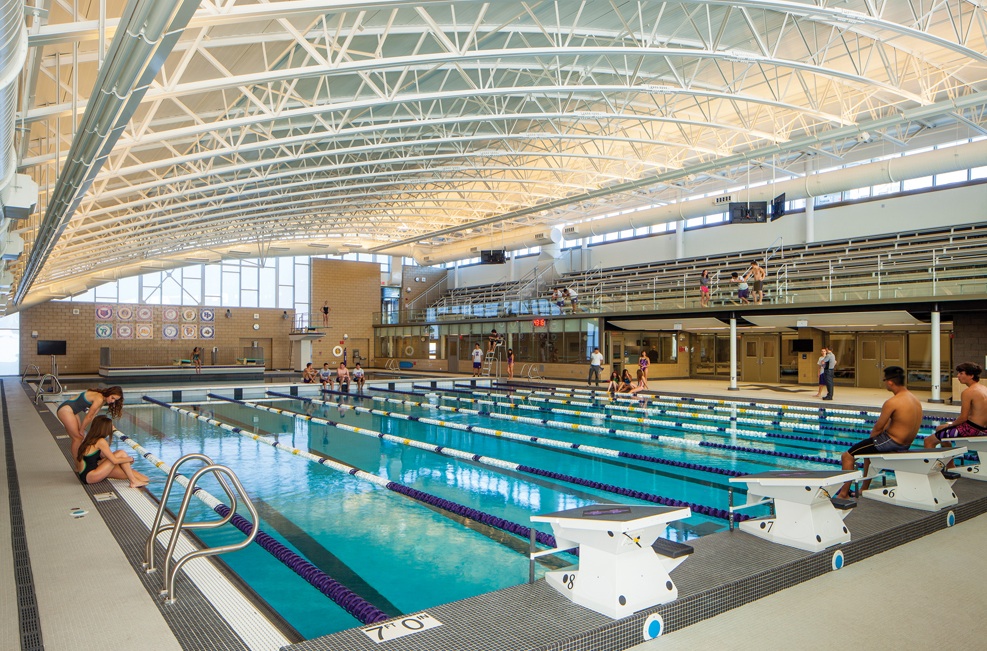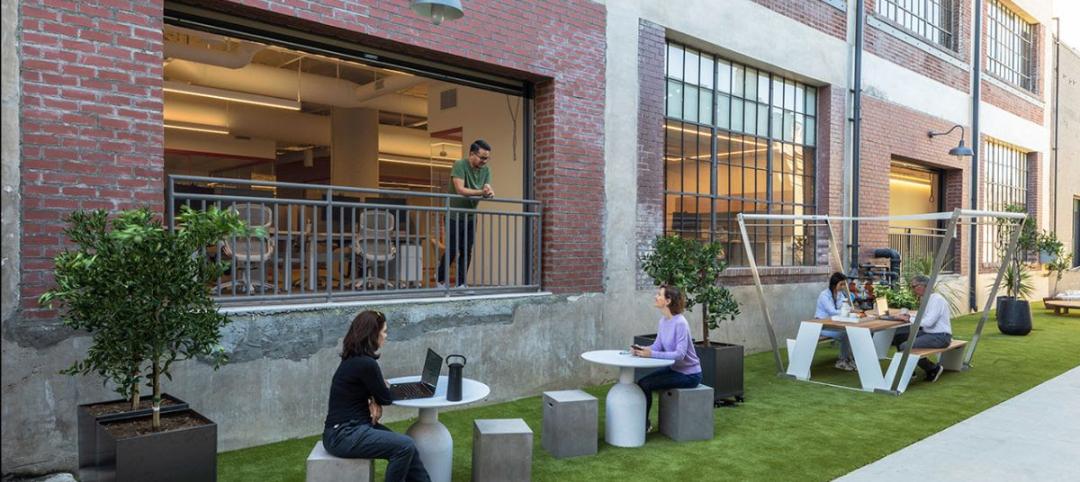The Building Team for the new Aquatics Center at Niles North High School in Skokie, Ill., included Chicago-area firms Legat Architects and IHC Construction—but a case could be made for listing a much larger group of official participants. The AEC firms made a concerted effort to involve not only district officials but also the user community. As a result, the project became a unique learning experience for students, staff, and neighbors.
The Niles North Aquatics Center serves 2,200 students—all of whom must take swimming—as well as 275 competitive student athletes in swimming, diving, and water polo. Feeder programs from park districts and local partners are also housed there. By 2012, the pool in the 48-year-old building was considered too small and shallow to meet current requirements.
Stakeholders asked for a new competition “cold pool,” a renovated community-accessible “warm pool,” a new public connecting corridor, locker room renovations, coaches’ offices, and meeting and storage space. Lighting and mechanical systems also needed an energy upgrade.
SILVER AWARD
Project summaryNiles North High School Aquatics Center
Skokie, Ill.BUILDING TEAM
Submitting firm: Legat Architects (architect)
Owner/developer: Niles Township High School District 219
Structural: KJWW Engineering Consultants
Mechanical/plumbing: AMSCO Engineering
Electrical: Hansen Palmer Associates
Civil: Gewalt Hamilton
CM: IHC Construction CompaniesGENERAL INFORMATION
Project size: 39,200 sf (24,600 sf new + 14,600 sf renovated)
Construction cost: $15 million
Construction period: April 2012 to August 2013
Delivery method: Design-bid-build
District 219 teamed with Legat Architects to plan the revitalization. Students and community members were surveyed regarding their priorities, and the Building Team held design workshops that elicited feedback for the floor plan. Daylighting is an important aspect of the final design, including a mix of clerestories, clear windows, translucent windows, and internal glazing to offer glare-free illumination and visual connections.
Eventually, the project was incorporated into the district’s architecture and engineering class curriculum. Biweekly tours were coordinated with faculty to focus on current classroom topics, and students were able to receive insights on various career paths.
“It became quite the living classroom,” says Building Team Awards judge Nathan Snydacker, PE, LEED AP, Vice President at Environmental Systems Design.
“It’s a lot of involvement you’d want in a school project of this type,” adds BTA judge Terry Fielden, LEED AP BD+C, Director of K-12 Education for International Contractors.
The Building Team phased construction over two summers to minimize disruption, keeping the community involved with a blog, video tours, signage with QR codes, and outreach to local news outlets.
In spring 2013, a severe flood created leaks in the lower-level filtration room. The damage stalled excavation and construction of the pool slab and walls, but IHC Construction, Legat, D219 staff, and other contractors managed to keep the job on schedule and within budget.
The result is a more functional, accessible, energy-efficient facility, designed to use 42% less water and 44% less energy than typical natatoriums. The project, whose heat-recovery dehumidification units should also sharply reduce CO2 emissions, is expected to become the first aquatic center in Illinois to achieve LEED for Schools Gold certification.
Related Stories
Airports | Apr 18, 2023
India's mammoth new airport terminal takes ‘back to nature’ seriously
On January 15, 2023, Phase 1 of the Kempegowda International Airport’s Terminal 2, in Bengaluru, India, began domestic operations. The 2.75 million-sf building, designed by Skidmore, Owings & Merrill (SOM), is projected to process 25 million passengers annually, while providing its travelers with a healthier environment, thanks to extensive indoor-outdoor landscaping that offers serenity to what is normally a frenzied experience.
Resiliency | Apr 18, 2023
AI-simulated hurricanes could aid in designing more resilient buildings
Researchers at the National Institute of Standards and Technology (NIST) have devised a new method of digitally simulating hurricanes in an effort to create more resilient buildings. A recent study asserts that the simulations can accurately represent the trajectory and wind speeds of a collection of actual storms.
Green | Apr 18, 2023
USGBC and IWBI unveil streamlined certification pathway for LEED and WELL green building programs
The U.S. Green Building Council, Green Business Certification Inc., and the International WELL Building Institute released a streamlined process for projects pursuing certifications for the LEED green building rating system and the WELL Building Standard. The new protocol simplifies documentation for projects that are pursuing both certifications at the same time or that have already earned one certification and are looking to add the other.
K-12 Schools | Apr 18, 2023
ASHRAE offers indoor air quality guide for schools
The American Society of Heating, Refrigerating and Air-Conditioning Engineers (ASHRAE) has released a guide for educators, administrators, and school districts on indoor air quality. The guide can be used as a tool to discuss options to improve indoor air quality based on existing HVAC equipment, regional objectives, and available funding.
Data Centers | Apr 14, 2023
JLL's data center outlook: Cloud computing, AI driving exponential growth for data center industry
According to JLL’s new Global Data Center Outlook, the mass adoption of cloud computing and artificial intelligence (AI) is driving exponential growth for the data center industry, with hyperscale and edge computing leading investor demand.
Healthcare Facilities | Apr 13, 2023
Healthcare construction costs for 2023
Data from Gordian breaks down the average cost per square foot for a three-story hospital across 10 U.S. cities.
Higher Education | Apr 13, 2023
Higher education construction costs for 2023
Fresh data from Gordian breaks down the average cost per square foot for a two-story college classroom building across 10 U.S. cities.
K-12 Schools | Apr 13, 2023
Creating a sense of place with multipurpose K-12 school buildings
Multipurpose buildings serve multiple program and functional requirements. The issue with many of these spaces is that they tend not to do any one thing well.
Healthcare Facilities | Apr 13, 2023
Urgent care facilities: Intentional design for mental and behavioral healthcare
The emergency department (ED) is the de-facto front door for behavior health crises, and yet these departments are understaffed, overwhelmed, and ill-equipped to navigate the layered complexities of highly demanding physical and behavioral health needs.
Office Buildings | Apr 13, 2023
L.A. headquarters for startup Califia Farms incorporates post-pandemic hybrid workplace design concepts
The new Los Angeles headquarters for fast-growing Califia Farms, a brand of dairy alternative products, was designed by SLAM with the post-Covid hybrid work environment in mind. Located in Maxwell Coffee House, a historic production facility built in 1924 that has become a vibrant mixed-use complex, the office features a café bordered by generous meeting rooms.

















